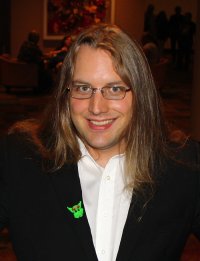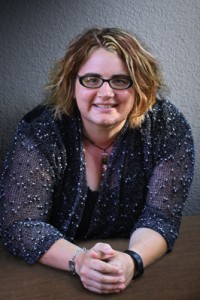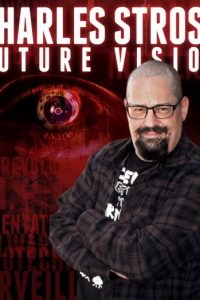Scott Lynch: Mythic Lineage
 Scott Lynch was born April 2, 1978 in St. Paul MN. He has worked as a dishwasher, waiter, web designer, office manager, and is currently a full-time writer and volunteer firefighter. He was married in 2006 and divorced in 2010. Author Elizabeth Bear is now his partner.
Scott Lynch was born April 2, 1978 in St. Paul MN. He has worked as a dishwasher, waiter, web designer, office manager, and is currently a full-time writer and volunteer firefighter. He was married in 2006 and divorced in 2010. Author Elizabeth Bear is now his partner.
Lynch began publishing with World Fantasy Award finalist The Lies of Locke Lamora (2006), first in a projected seven volumes of the Gentleman Bastard series of high-fantasy crime/caper novels. Book two, Red Seas under Red Skies, appeared in 2007, and third volume The Republic of Thieves in late 2013.
In August 2009 he began serializing Queen of the Iron Sands, a science fantasy about a female aviator transported to a fantastical Mars, on his website. Lynch writes short fiction occasionally, with publications including ‘‘In the Stacks’’ (2010), ‘‘He Built the Wall to Knock it Down’’ (2012), and ‘‘The Effigy Engine: A Tale of the Red Hats’’ (2013). Lynch received the Sydney J. Bounds Best Newcomer Award from the British Fantasy Society in 2008.
He lives in Wisconsin, just across the border from Minnesota.
Excerpts from the interview:
“This is going to sound really silly, but when I was 11 I started reading L. Ron Hubbard’s Mission Earth decalogy, and it took me over a year. I was too young and naive to realize that this was (a) intended to be satire and (b) written by a crazy person (or his literary heirs). I was reading it as this straightforward epic space opera a million miles long, that went on forever. I was shocked a couple of years later when I’d grown old enough to realize this was not the way it really was.
 ‘‘But I’m still in love with the notion of the long series. I know a lot of science fiction and fantasy readers roll their eyes and curse the heavens: ‘Oh god, long series!’ I’m a proponent of long series; I just want them to be worth it – every chapter, every book, every installment in a sequence. My major ambition is essentially to write long sequences that don’t have dead bits or padding, that deserve their full length, because that’s what I was enchanted with when I was a little kid.
‘‘But I’m still in love with the notion of the long series. I know a lot of science fiction and fantasy readers roll their eyes and curse the heavens: ‘Oh god, long series!’ I’m a proponent of long series; I just want them to be worth it – every chapter, every book, every installment in a sequence. My major ambition is essentially to write long sequences that don’t have dead bits or padding, that deserve their full length, because that’s what I was enchanted with when I was a little kid.
‘‘I have firm plans for the Gentleman Bastard sequence. Assuming that it continues to be commercially successful enough that my publishers will give me carte blanche to keep going, I would like to follow it with a further seven books, set about 20 years after the end of Inherit the Night, book seven of the current sequence. Picking up generationally from what has happened before, while some old characters will return, a largely new cast would have to deal with the consequences of what happened in the first seven books.
‘‘But The Gentleman Bastard is also intended to be a complete sequence in and of itself. If you look at The Lies of Locke Lamora, it’s a complete novel. It doesn’t end on a cliffhanger – it invites sequels without requiring them. And every book in the sequence (with maybe one exception) is going to be a full and complete story in between its two covers. I just hope that by the time the seven books are finished, I’ve made it clear that there’s a basis for continuing it. Ideally, another seven and that will be it: a mere 14 books.”
…
 “Had I published The Republic of Thieves in 2008, had I written it as the person I was then…. There’s no other way to say it but that the guy that went in one side of the book is not the guy that came out the other, having been divorced and depressed and learning things about life he never wanted do. I started it much more naive, much less developed, and much less careful. It’s not that I’m not proud of The Lies of Locke Lamorra and Red Seas Under Red Skies, but I think Republic is a much more carefully considered piece of work. Part of that is because I had to reteach myself how to work. It wasn’t that I wasn’t writing during the ‘dark period,’ but virtually everything I turned out was useless. The only piece I sold for about four years was the short story ‘In the Stacks’ for Jonathan Strahan, and I was such a wreck I couldn’t even edit that!”
“Had I published The Republic of Thieves in 2008, had I written it as the person I was then…. There’s no other way to say it but that the guy that went in one side of the book is not the guy that came out the other, having been divorced and depressed and learning things about life he never wanted do. I started it much more naive, much less developed, and much less careful. It’s not that I’m not proud of The Lies of Locke Lamorra and Red Seas Under Red Skies, but I think Republic is a much more carefully considered piece of work. Part of that is because I had to reteach myself how to work. It wasn’t that I wasn’t writing during the ‘dark period,’ but virtually everything I turned out was useless. The only piece I sold for about four years was the short story ‘In the Stacks’ for Jonathan Strahan, and I was such a wreck I couldn’t even edit that!”
…
‘‘Science fiction and fantasy, the whole genre at the moment, is in a shaky and disruptive transitional state. It’s uncomfortable for a lot of people for a couple of reasons: we now have more than a thimbleful of non-Caucasians writing in every flavor of every genre, and we’ve reached a point of demographic change (and economic change) across the world. As Samuel Delany predicted in an interview back in 1998, that has led to disruption in our field. Many of the leading lights, the mature lights, came of age in the post-WWII era of unquestioned American technical and economic supremacy, and that has shifted in the last 30 years.
‘‘Writers today are staring straight into the face of an economically powerful India and an economically powerful China. I think Western science fiction writers have always been content to put these things into their stories in a sort of background and offhand fashion. For the bulk of American science fiction writers who came out of the military/aerospace/academic complex you can see it in their work: they will have a Chinese person or an Indian person, so on and so forth. But confronting the reality of billions of technically capable, economically advanced non-Westerners now on our planet as an actual fact is a little bit beyond them. The future has caught up with them, and it’s not quite the future they were always writing about. There’s an element of huge culture shock.”
…
‘‘I was born in 1978, and I feel that the world should be frankly closer to Star Trek than it is. We should be further along toward a general, useful sense of gender and racial and economic and social equality. There is something called kyriarchal theory, which interests me greatly, because I think it’s the keystone to a lot of arguments and a lot of problems. Loosely put, it’s sort of a post-feminist theory (and that’s the most pretentious thing I’ve said all day). It’s an outgrowth of feminism, and essentially says that the patterns of oppressive behavior and bad behavior, in a dominance hierarchy, continue to perpetuate themselves even after the original oppressive demographic has weakened or moved on or even been removed entirely – i.e., you can kick the white dudes out of the dominant hierarchy, but the hierarchy continues. This is a way of looking at all of these distasteful and repressive behaviors, and combining them into one matrix of bad behavior.
‘‘It’s a lens that I find very useful, because I don’t think you really can separate all these issues. I am a heterosexual white male, Irish-German. I am that white guy. I come from the suburbs of Minnesota, for cryin’ out loud! I had an idyllic time growing up. I guess I just feel a generalized burning distaste for cruelty and injustice perpetuated because of laziness and fear of the future. We are not supposed to fear the future in this profession; we are supposed to be building and embracing it.”






